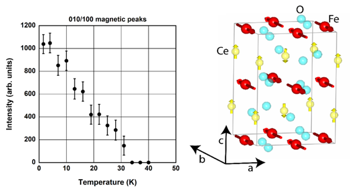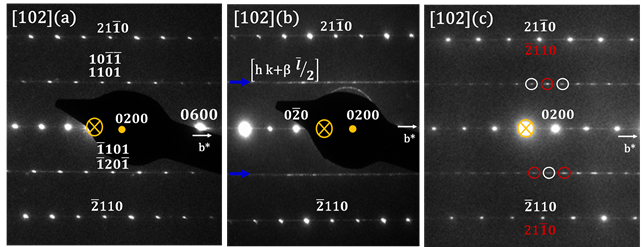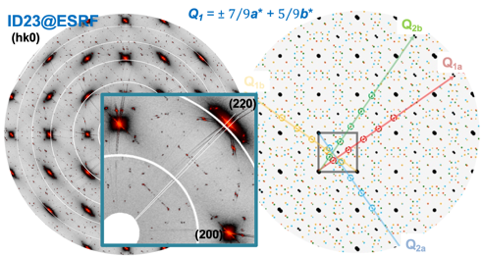Structure de formation
Faculté des Sciences
Programme
Electron Microscopy, Crystallography
6 créditsSurface properties M2
3 créditsThermodynamics and defects of solids M2
5 créditsSummer School: Large Scale Facilities
7 crédits72hProject preparation Master Thesis
3 créditsThin films and extreme conditions M2
3 créditsMaterials for catalysis M2
3 crédits
Master thesis
30 crédits
Electron Microscopy, Crystallography
Niveau d'étude
BAC +5
ECTS
6 crédits
Structure de formation
Faculté des Sciences


The structural characterization of Materials is a mandatory prerequisite to develop functional materials and an absolute must for materials science researchers and engineers. For the interpretation of diffraction patterns, structures, microstructures etc., a detailed knowledge in crystallography, structure analysis but equally of the instruments used is necessary. The necessary knowledge is developed from the scratch, progressively yielding an understanding on how to characterize materials by standard and sophisticated diffraction methods. The lecture also includes lab work on powder and single crystal diffractometers, allowing to acquire the competencies to correctly use and interpret diffraction data. The lecture during the 1st semester involves essentially X-ray diffraction as well as electron microscopy, while the crystallography part continues during the 2nd semester with symmetry, structure solution and structure refinements as well as neutron scattering and magnetic structure analysis.
This lecture contains 2 parts:
(1): Crystallography:
This part is essentially dedicated o get familiarized with structure analysis and its application. After a brief introduction of the reciprocal lattice concept and the use of space groups in crystallography, the lecture focusses on structure analysis by diffraction methods using powder and single crystal X-ray and neutron scattering methods. This concerns an understanding into related techniques, i.e. the use of powder and single crystal diffractometers, as well the techniques and programs used today for structure refinements. The concept of the lecture is to introduce into a basic understanding of what is behind the programs, rather than to use them blindly. Students will also collect single crystal diffraction data on a performant 4 cycle diffractometer with a 2D area detector, as well as magnetic structure analysis using neutron diffraction methods.
Simple inorganic structures: Space groups, X-ray/neutron and synchrotron sources, interaction of X-rays, electrons and neutrons with matter, reciprocal lattice, concept of Ewald sphere, powder diffractometers, single crystal diffractometers, orienting matrix, Patterson method, structure refinement from powder or single crystal data, magnetic structure analysis, magnetic space groups,
(2): Electron microscopy:
In this part, we will be interested in electron microscopy through flipped classes. We will discuss the following topics: Electron sources, lens and aberrations, sample preparation, electron diffraction, Structural and chemical analysis, Imaging techniques.

Volumes horaires* :
CM : 33 h
TD :18 h
Surface properties M2
Niveau d'étude
BAC +5
ECTS
3 crédits
Structure de formation
Faculté des Sciences
This course provides a comprehensive knowledge and tools that relate to surface properties and interfacial behaviour of crystalline and amorphous solids in different media. It contains two parts: (1) Fundamentals of Colloid and Surface Science, divided and porous solids
(2) Surface characterisation techniques and surface analysis
Volumes horaires* :
CM : 17 h
TD : 8 h
Thermodynamics and defects of solids M2
ECTS
5 crédits
Structure de formation
Faculté des Sciences
Summer School: Large Scale Facilities
Niveau d'étude
BAC +5
ECTS
7 crédits
Structure de formation
Faculté des Sciences
Volume horaire
72h
The objective is to provide second year students master a good introduction in the use of "Large Scale Facilities" for the study and characterization of materials. In particular, we focus on the use of neutron scattering and 3rd generation synchrotron sources for the study of materials. Indeed, to date, the development and optimization of materials often require sophisticated methods, sometimes accessible only at Large Scale Facilities. This presents a major challenge for basic research and applied. The courses, which take place over two consecutive weeks, give basic instruction on the production of neutrons and synchrotron radiation as well as their specific applications and complementarity. The course content is as follows:
- Neutron and synchrotron sources
- Interaction neutrons/synchrotron radiation with matter
- Diffraction methods and instrumentation for neutron and X-ray (synchrotron) scattering
- Spectroscopy: inelastic neutron scattering and X-ray absorption spectroscopy
- Magnetic neutron scattering
- Presentation of neutron and synchrotron beamlines
Project preparation Master Thesis
Niveau d'étude
BAC +4
ECTS
3 crédits
Structure de formation
Faculté des Sciences
The aim of this module is to prepare the master thesis project which will last six months during S4.
The thesis project implies the use of large scale facilities (preparation and obtention of the beam time access for neutron/synchrotron radiation). You will have to explore the state of art of the master thesis project and prepare optimum experimental conditions (optimization of experiments on light lines or neutron).
This module will help to develop 'transversal' skills such as the development and organization of a scientific project (organization between universities and different EU research centers)
as well as communication skills.
Thin films and extreme conditions M2
ECTS
3 crédits
Structure de formation
Faculté des Sciences
Materials for catalysis M2
Niveau d'étude
BAC +5
ECTS
3 crédits
Structure de formation
Faculté des Sciences
Thermodynamic and kinetic bases to understand the optimal conditions for catalytic reactions and the requirement of activity and accessibility of catalysts.
Methods for the preparation of porous and dispersed catalysts by nucleation-growth, aggregation and templating mechanisms.
Correlations between structural properties and activity of heterogeneous catalysts.
Examples of applications of heterogeneous catalysts to processes of refining and industrial chemistry.
Further on basic concepts of photocatalysis and electrocatalysis are explored
Volumes horaires* :
CM : 17 h
TD : 8 h
Master thesis
Niveau d'étude
BAC +5
ECTS
30 crédits
Structure de formation
Faculté des Sciences
The 4th semester of the Master Course is entirely dedicated to the 5 months (minimum) master thesis project in Materials Science. Students get enrolled in a research topic, and to contribute to a scientific problem in a research team. It allows to apply acquired and to learn new scientific skills in order to identify the problem and to proceed for a (possible) solution. The topic is analysed and described in the written Master thesis memory and presented orally in from of a jury. It should allow the candidate to show his ability to conduct a scientific problem and to present it in an analytical way.


